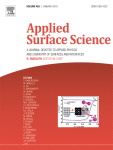|
Autores/as
W. Kim; D. Monllor-Satoca ; W-S. Chae; M. A. Mahadik; J. S. Jang ; W-S. Chae; M. A. Mahadik; J. S. Jang
|
Abstract
Various solar conversion materials with 1D nanostructure have been developed and are being widely investigated for various solar fuel generation applications. In this study, aligned and non-aligned CdS nanowires (NWs) were synthesized on Cd foil or in solution via solvothermal processes. In the case of aligned CdS NWs, the relative intensity of the (0 0 2) diffraction peak was higher than that of the non-aligned CdS NWs, which indicated that the NWs grew preferentially in the (0 0 1) direction. The systematic comparison between the photoelectrochemical properties of both electrodes revealed that the aligned CdS NW electrode displayed markedly enhanced photocurrent (by a factor of 7), photoelectrochemical hydrogen production (by a factor of 10), and photostability in comparison with those of the non-aligned NWs electrode fabricated on FTO glass. Resistance (Rµ) through the inner part of the aligned CdS NWs was very small due to a low grain-boundary resistance (by a factor of 130). This low resistance induced efficient charge transfer, reducing the charge recombination loss and assisting the charge transport along the axial direction of the aligned NWs. Time-resolved photoluminescence spectroscopy confirmed that the charge separation in the aligned CdS NWs is longer than that in the non-aligned CdS NWs (by a factor of 1.6).
|

WoS
Scopus
Altmetrics
 
|
